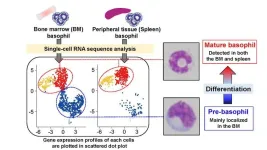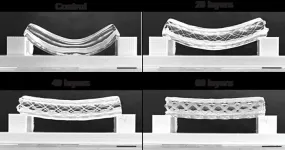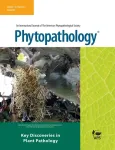(Press-News.org) Study led by University of Oxford researchers has revealed the mechanisms that cause lithium metal solid-state batteries to fail.
Researchers used a high-resolution imaging method to visualize batteries in unprecedented detail during charging.
The new insights could help overcome the technical issues with solid-state batteries, unlocking a game-changing technology for electric vehicles and aviation.
Significantly improved electric vehicle (EV) batteries could be a step closer thanks to a new study led by University of Oxford researchers, published today in Nature. Using advanced imaging techniques, this revealed mechanisms which cause lithium metal solid-state batteries (Li-SSBs) to fail. If these can be overcome, solid-state batteries using lithium metal anodes could deliver a step-change improvement in EV battery range, safety and performance, and help advance electrically powered aviation.
One of the co-lead authors of the study Dominic Melvin, a PhD student in the University of Oxford’s Department of Materials, said: ‘Progressing solid-state batteries with lithium metal anodes is one of the most important challenges facing the advancement of battery technologies. While lithium-ion batteries of today will continue to improve, research into solid-state batteries has the potential to be high-reward and a gamechanger technology.’
Li-SSBs are distinct from other batteries because they replace the flammable liquid electrolyte in conventional batteries with a solid electrolyte and use lithium metal as the anode (negative electrode). The use of the solid electrolyte improves the safety, and the use of lithium metal means more energy can be stored. A critical challenge with Li-SSBs, however, is that they are prone to short circuit when charging due to the growth of ‘dendrites’: filaments of lithium metal that crack through the ceramic electrolyte. As part of the Faraday Institution’s SOLBAT project, researchers from the University of Oxford’s Departments of Materials, Chemistry and Engineering Science, have led a series of in-depth investigations to understand more about how this short-circuiting happens.
In this latest study, the group used an advanced imaging technique called X-ray computed tomography at Diamond Light Source to visualise dendrite failure in unprecedented detail during the charging process. The new imaging study revealed that the initiation and propagation of the dendrite cracks are separate processes, driven by distinct underlying mechanisms. Dendrite cracks initiate when lithium accumulates in sub-surface pores. When the pores become full, further charging of the battery increases the pressure, leading to cracking. In contrast, propagation occurs with lithium only partially filling the crack, through a wedge-opening mechanism which drives the crack open from the rear.
This new understanding points the way forward to overcoming the technological challenges of Li-SSBs. Dominic Melvin said: ‘For instance, while pressure at the lithium anode can be good to avoid gaps developing at the interface with the solid electrolyte on discharge, our results demonstrate that too much pressure can be detrimental, making dendrite propagation and short-circuit on charging more likely.’
Sir Peter Bruce, Wolfson Chair, Professor of Materials at the University of Oxford, Chief Scientist of the Faraday Institution, and corresponding author of the study, said: ‘The process by which a soft metal such as lithium can penetrate a highly dense hard ceramic electrolyte has proved challenging to understand with many important contributions by excellent scientists around the world. We hope the additional insights we have gained will help the progress of solid-state battery research towards a practical device.’
According to a recent report by the Faraday Institution, SSBs may satisfy 50% of global demand for batteries in consumer electronics, 30% in transportation, and over 10% in aircraft by 2040.
Professor Pam Thomas, CEO, Faraday Institution, said: ‘SOLBAT researchers continue to develop a mechanistic understanding of solid-state battery failure – one hurdle that needs to be overcome before high-power batteries with commercially relevant performance could be realised for automotive applications. The project is informing strategies that cell manufacturers might use to avoid cell failure for this technology. This application-inspired research is a prime example of the type of scientific advances that the Faraday Institution was set up to drive.’
Notes to editors:
For media enquiries and interview requests, contact Dr Caroline Wood, Communications Manager, University of Oxford: caroline.wood@admin.ox.ac.uk
The study ‘Dendrite initiation and propagation in lithium metal solid-state batteries’ will be published in Nature on Wednesday 07 June 2023 at 16:00 (London time), 07 June 2023 at 11:00 (US Eastern Time) at https://www.nature.com/articles/s41586-023-05970-4. This link will go live when the embargo lifts. To view a copy of the article before this, contact Dr Caroline Wood: caroline.wood@admin.ox.ac.uk
About the University of Oxford
Oxford University has been placed number 1 in the Times Higher Education World University Rankings for the seventh year running, and number 2 in the QS World Rankings 2022. At the heart of this success are the twin-pillars of our ground-breaking research and innovation and our distinctive educational offer.
Oxford is world-famous for research and teaching excellence and home to some of the most talented people from across the globe. Our work helps the lives of millions, solving real-world problems through a huge network of partnerships and collaborations. The breadth and interdisciplinary nature of our research alongside our personalised approach to teaching sparks imaginative and inventive insights and solutions.
Through its research commercialisation arm, Oxford University Innovation, Oxford is the highest university patent filer in the UK and is ranked first in the UK for university spinouts, having created more than 200 new companies since 1988. Over a third of these companies have been created in the past three years. The university is a catalyst for prosperity in Oxfordshire and the United Kingdom, contributing £15.7 billion to the UK economy in 2018/19, and supports more than 28,000 full time jobs.
END
New study could help unlock ‘game-changing’ batteries for electric vehicles and aviation
2023-06-07
ELSE PRESS RELEASES FROM THIS DATE:
New study identifies mechanism driving the sun’s fast wind
2023-06-07
The fastest winds ever recorded on Earth reached more than 200 miles per hour, but even those gusts pale in comparison to the sun’s wind.
In a paper published June 7, 2023 in the journal Nature, a team of researchers used data from NASA’s Parker Solar Probe to explain how the solar wind is capable of surpassing speeds of 1 million miles per hour. They discovered that the energy released from the magnetic field near the sun’s surface is powerful enough to drive the fast solar wind, which is made up of ...
Pre-basophils: A basophil origin story
2023-06-07
Researchers from Tokyo Medical and Dental University (TMDU) find that pre-basophil and mast cell progenitors differentiate into pre-basophils before producing mature basophils in mice
Tokyo, Japan – Big changes often happen in small steps, and it’s not always easy to see how we get from point A to point B. Now, researchers from Japan have found a new step in the process of cell differentiation that leads to the production of fully functional basophils, which are critical cells in the immune system.
In a study published this month in Nature Communications, researchers from Tokyo Medical and Dental University (TMDU) have revealed a previously unknown intermediate ...
Study uncovers role of ultraviolet radiation in development of rare leukemia in the skin
2023-06-07
BOSTON – A change of scenery can restore one's outlook, but for some precancerous cells, a journey from the caves of the bone marrow to the sunny climes of the skin can trigger genetic changes that are a harbinger of cancer, according to a new study by researchers at Dana-Farber Cancer Institute, Brigham and Women's Hospital, and the Broad Institute of MIT and Harvard.
The study, published online today by the journal Nature, is one of the first to uncover the "genetic travelogue" ...
Evaluating AI responses to public health questions
2023-06-07
About The Study: This analysis of the quality of responses to public health questions found that ChatGPT consistently provided evidence-based answers, although it primarily offered advice rather than referrals. Given the same addiction questions, Amazon Alexa, Apple Siri, Google Assistant, Microsoft’s Cortana, and Samsung’s Bixby collectively recognized 5% of the questions and made one referral, compared with 91% recognition and two referrals with ChatGPT.
Authors: John W. Ayers, Ph.D., M.A., of the University of California San Diego in La Jolla, is the corresponding author.
To ...
NCCN releases statement addressing ongoing chemotherapy shortages; Shares survey results finding more than 90% of cancer centers are impacted
2023-06-07
PLYMOUTH MEETING, PA [June 7, 2023] — The National Comprehensive Cancer Network® (NCCN®)—an alliance of leading academic cancer centers—published survey results today that shed light on just how widespread the current platinum chemotherapy shortage is, and shared a statement calling on the whole oncology community to work together on solutions.
“This is an unacceptable situation. We are hearing from oncologists and pharmacists across the country who have to scramble to find appropriate alternatives for treating their patients with ...
Combining bioprinting techniques to pursue functional blood vessels
2023-06-07
In this project volumetric bioprinting was for the first time successfully combined with melt electrowriting. This combines the speed and cell-friendliness of volumetric printing with the structural strength needed to create functional blood vessels. The study by the biofabrication lab of Regenerative Medicine Center Utrecht (RMCU) was published today in Advanced Materials.
Volumetric printing is a technique that was pioneered for bioprinting by the RMCU biofabrication lab in 2019. It is a fast technique, which allows cells to survive the printing process. However, because this ...
Leading plant science journal publishes a special issue on key discoveries in plant pathology
2023-06-07
In just 7 years, the Irish Potato Famine caused approximately one million people to starve to death and forced another estimated million to flee Ireland as refugees. A mold called Phytophthora infestans infected Ireland’s potato crop, a staple food, and spread rapidly throughout the island. The seemingly tiny fungus destroyed roughly 75% of potato crops over the duration of the great hunger. This catastrophic famine, along with several others in various parts of the world throughout history, highlighted the critical need for the study of plant diseases.
Decades ...
Autonomous products like robot vacuums make our lives easier. But do they deprive us of meaningful experiences?
2023-06-07
Researchers from University of St. Gallen and Columbia Business School published a new Journal of Marketing article that examines how the perceived meaning of manual labor can help predict the adoption of autonomous products.
The study, forthcoming in the Journal of Marketing, is titled “Meaning of Manual Labor Impedes Consumer Adoption of Autonomous Products” and is authored by Emanuel de Bellis, Gita Venkataramani Johar, and Nicola Poletti.
Whether it is cleaning homes or mowing lawns, consumers increasingly delegate manual tasks to autonomous products. These gadgets operate without human oversight and free consumers from ...
Paul Ellison, PhD, receives SNMMI Mars Shot Fund award
2023-06-07
Reston, Virginia—The SNMMI Mars Shot Research Fund is excited to announce that Paul Ellison, PhD, assistant professor at the Department of Medical Physics at the University of Wisconsin School of Medicine and Public Health in Madison, has been selected as the recipient of a $500,000 grant from the 2023 Mars Shot Fund. The grants recognize individuals who have made transformative impact in the field and elevated the value of nuclear medicine and molecular imaging.
The grant is one of five awarded in the inaugural year of the new SNMMI Mars Shot Research Fund, which ...
Amir Iravani, MD, receives SNMMI Mars Shot Fund award
2023-06-07
Reston, Virginia—The SNMMI Mars Shot Research Fund is excited to announce that Amir Iravani, MD, associate professor of radiology in the Department of Radiology at the University of Washington School of Medicine in Seattle, Washington, has been selected as the recipient of a $1,000,000 SNMMI Mars Shot Fund Grant. The grants recognize individuals who have made transformative impact in the field and elevated the value of nuclear medicine and molecular imaging.
The grant is one of five awarded in the inaugural year of the new SNMMI Mars Shot Research Fund, which was established to provide resources that translate visionary nuclear medicine imaging, radiopharmaceutical therapy ...





